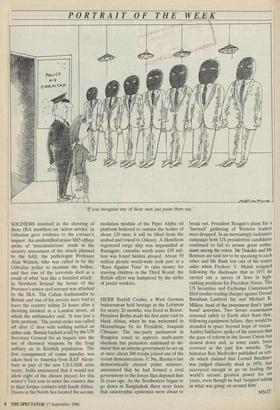PORTRAIT OF THE WEEK
'If you recognise any of these men just point them out.'
SOLDIERS involved in the shooting of three IRA members on 'active service' in Gibraltar gave evidence to the coroner's inquest. An unidentified senior MI5 officer spoke of 'miscalculations' made in the security assessment of the attack planned by the SAS; the pathologist Professor Alan Watson, who was called in by the Gibraltar police to examine the bodies, said that one of the terrorists died as a result of what 'was like a frenzied attack'. In Northern Ireland the house of the Province's senior civil servant was attacked by the IRA. The Cuban Ambassador to Britain and one of his envoys were told to leave the country within 24 hours after a shooting incident in a London street, of which the ambassador said, 'It was just a little problem.' The postal strike was called off after 12 days with nothing settled on either side. Britain backed a call by the UN Secretary General for an inquiry into the use of chemical weapons by the Iraqi military on its Kurdish population. The first consignment of cruise missiles was taken back to America from RAF Alcon- bury as part of the new US-USSR arms treaty. India announced that it would not allow eight of the chosen players for this winter's Test tour to enter the country due to their former contacts with South Africa. Divers in the North Sea located the accom- modation module of the Piper Alpha oil platform believed to contain the bodies of about 120 men: it will be lifted from the seabed and towed to Orkney. A Honduras registered cargo ship was impounded at Ramsgate; cannabis worth some £30 mil- lion was found hidden aboard. About 50 million people world-wide took part in a 'Race Against Time' to raise money for starving children in the Third World: the British effort was hampered by the strike of postal workers.
HERR Rudolf Cordes, a West German businessman held hostage in the Lebanon for nearly 20 months, was freed in Beirut. President Botha made his first state visit to black Africa, when he was welcomed to Mozambique by its President, Joaquim Chissano. The one-party parliament in Rangoon voted to approve multi-party elections but protesters continued to de- mand that an interim government be set up at once; about 500 troops joined one of the recent demonstrations. U Nu, Burma's last democratically elected prime minister, announced that he had formed a rival government to the forces that deposed him 26 years ago. As the floodwaters began to go down in Bangladesh there were fears that catastrophic epidemics were about to break out. President Reagan's plans for a 'farewell' gathering of Western leaders were dropped. In an increasingly lacklustre campaign both US presidential candidates continued to fail to arouse great enthu- siasm among the voters. Mr Dukakis and Mr Bentsen are said not to be speaking to each other and Mr Bush lost one of his senior aides when Frederic V. Malek resigned following the disclosure that in 1971 he carried out a survey of Jews in high- ranking positions for President Nixon. The US Securities and Exchange Commission filed insider-trading charges against Drexel Burnham Lambert Inc and Michael R. Milken, head of the investment firm's 'junk bond' activities. Two Soviet cosmonauts returned safely to Earth after fears that, following equipment failure, they would be stranded in space beyond hope of rescue. Andrei Sakharov spoke of his concern that the pace of reform in the Soviet Union has slowed down and, in some cases, been reversed in the past few months. The historian Roy Medvedev published an arti- cle which claimed that Leonid Brezhnev was judged clinically dead in 1976, but recovered enough to go on leading the world's second greatest power for six years, even though he had 'stopped taking in what was going on around him'.
MStJT


































































 Previous page
Previous page